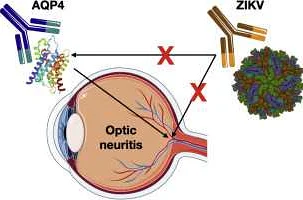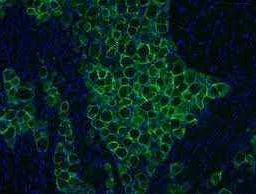Test for antibodies to aquaporin 4
Содержимое
Learn about the test for antibodies to aquaporin 4, which is used to diagnose neuromyelitis optica (NMO) and related autoimmune disorders. Understand the procedure, its significance, and how it can help in the accurate diagnosis and management of these conditions.
Are you experiencing symptoms of neuromyelitis optica? This rare autoimmune disorder affects the central nervous system, causing inflammation in the optic nerves and spinal cord. Early diagnosis is crucial for effective treatment and management of the disease.
Introducing the test for antibodies to aquaporin 4 – a breakthrough diagnostic tool. Aquaporin 4 (AQP4) is a water channel protein found in the brain, optic nerves, and spinal cord. Antibodies against AQP4 have been identified as a biomarker for neuromyelitis optica. Detecting these antibodies in your system can help confirm a diagnosis and guide treatment decisions.
Why choose our test? Our state-of-the-art assay utilizes advanced technology to identify the presence of AQP4 antibodies with exceptional accuracy. The test is quick, reliable, and minimally invasive, requiring only a blood sample. Results are provided in a timely manner, enabling healthcare professionals to make well-informed decisions regarding your care.
Don’t delay your diagnosis. Knowing whether you have neuromyelitis optica is crucial for receiving appropriate treatment and managing your symptoms effectively. Talk to your healthcare provider today about the test for antibodies to aquaporin 4.
Overview of Neuromyelitis Optica

Neuromyelitis optica (NMO), also known as Devic’s disease, is a rare autoimmune disorder that affects the central nervous system. It primarily targets the optic nerves and the spinal cord, leading to severe vision impairment and paralysis.
Unlike multiple sclerosis (MS), NMO specifically attacks the aquaporin-4 protein, which is found on the surface of certain cells in the nervous system. This protein plays a crucial role in regulating the flow of water in and out of cells, ensuring proper functioning of the nervous system.
Individuals with NMO often experience recurrent episodes of optic neuritis, which causes inflammation and damage to the optic nerves. This can result in blurred vision, loss of color vision, and even complete blindness in severe cases.
In addition to optic neuritis, NMO can cause transverse myelitis, inflammation of the spinal cord. This can lead to weakness, numbness, and loss of motor function below the affected area. Some individuals may experience bladder and bowel dysfunction as well.
The exact cause of NMO is still unknown, but it is believed to involve a combination of genetic and environmental factors. Certain genetic variations have been associated with an increased risk of developing NMO, and certain viral infections, such as the Epstein-Barr virus, have also been linked to the disease.
Early diagnosis and treatment are crucial for managing NMO and preventing further damage to the nervous system. Testing for antibodies to aquaporin-4, such as the test offered by our company, is an important diagnostic tool for confirming a diagnosis of NMO and differentiating it from other conditions with similar symptoms.
Once diagnosed, treatment for NMO typically involves a combination of immunosuppressive medications and therapies to manage symptoms and prevent relapses. Ongoing monitoring and follow-up care are important for long-term management and to adjust treatment as needed.
Overall, understanding the underlying mechanisms of NMO and having effective diagnostic tools, such as the test for antibodies to aquaporin-4, can greatly improve the lives of individuals with this challenging autoimmune disorder.
Importance of Diagnostic Tools

Diagnostic tools play a crucial role in the field of medicine and healthcare. They assist medical professionals in identifying and diagnosing various diseases and conditions accurately. These tools enable doctors to make informed decisions about treatment plans, ensuring that patients receive the most appropriate care.
One such important diagnostic tool is the test for antibodies to aquaporin 4. This test is particularly significant in the diagnosis of neuromyelitis optica, a severe autoimmune disorder that affects the central nervous system. By detecting the presence of antibodies to aquaporin 4, medical professionals can confirm the diagnosis and initiate appropriate treatment.
The test for antibodies to aquaporin 4 is a specialized diagnostic tool that offers several advantages. Firstly, it is highly sensitive and specific, meaning that it can accurately identify the presence of these specific antibodies in the patient’s blood. This allows for early detection and intervention, improving the chances of a favorable outcome.
Furthermore, the test is non-invasive, making it a safe and convenient option for patients. It involves a simple blood test, eliminating the need for invasive procedures or surgeries. This makes it an ideal diagnostic tool for patients of all ages and conditions.
Additionally, the results of the test for antibodies to aquaporin 4 can have a significant impact on the management of neuromyelitis optica. By providing valuable information about the patient’s immune response, medical professionals can tailor treatment plans accordingly. This personalized approach leads to improved patient outcomes and a higher quality of life.
In conclusion, diagnostic tools, such as the test for antibodies to aquaporin 4, are vital in modern medicine. They allow medical professionals to accurately diagnose and treat various conditions, leading to better patient care and outcomes. The importance of these tools cannot be overstated, as they significantly contribute to the overall health and well-being of individuals.
Understanding Aquaporin 4
Aquaporin 4 (AQP4) is a protein that plays a crucial role in the human body, particularly in the central nervous system. It is a type of water channel protein that allows the movement of water molecules across cell membranes.
AQP4 is primarily found in the brain, spinal cord, and certain regions of the eye, including the retina and optic nerve. It is especially important in maintaining the water balance in these areas and regulating the flow of cerebrospinal fluid.
Neuromyelitis optica (NMO) is a rare autoimmune disorder that primarily affects the optic nerves and spinal cord. It is believed to be caused by the immune system mistakenly attacking AQP4, leading to inflammation and damage to these areas.
The test for antibodies to aquaporin 4 (AQP4-IgG) is a crucial diagnostic tool for NMO. It helps in identifying the presence of antibodies that target AQP4 in the body, indicating a higher likelihood of NMO. This test plays a crucial role in distinguishing NMO from other similar neurological conditions and guiding appropriate treatment strategies.
Understanding the role of AQP4 and the significance of testing for antibodies can lead to better diagnosis, treatment, and management of neuromyelitis optica. It enables healthcare professionals to provide targeted interventions and improve the quality of life for individuals affected by this condition.
Test for Antibodies to Aquaporin 4
Neuromyelitis optica (NMO) is a rare autoimmune disease that affects the central nervous system. It is characterized by severe inflammation and demyelination of the optic nerve and spinal cord. Early diagnosis is crucial for effective treatment and management of this debilitating condition.
The test for antibodies to aquaporin 4 (AQP4) has emerged as an important diagnostic tool for NMO. Aquaporin 4 is a protein that plays a crucial role in maintaining the water balance in the body. In individuals with NMO, the immune system mistakenly targets and attacks aquaporin 4, leading to the characteristic inflammation and damage.
The test for antibodies to aquaporin 4 works by detecting the presence of these antibodies in a patient’s blood sample. A positive result indicates the presence of the antibodies and suggests a diagnosis of NMO. This test is highly specific and sensitive, allowing for accurate and early detection of the disease.
Early diagnosis of NMO is vital as it enables healthcare professionals to initiate appropriate treatment strategies promptly. Prompt treatment can help alleviate symptoms, prevent relapses, and slow down the progression of the disease. The test for antibodies to aquaporin 4 is an essential tool in the diagnostic arsenal of healthcare professionals, helping them make informed decisions regarding treatment plans for patients with NMO.
Furthermore, the test for antibodies to aquaporin 4 can aid in distinguishing NMO from other neurological conditions with similar symptoms. This differentiation is crucial as the management and treatment strategies for NMO differ from those of other diseases.
In conclusion, the test for antibodies to aquaporin 4 is an important diagnostic tool for neuromyelitis optica. Its accuracy and sensitivity enable healthcare professionals to make timely and accurate diagnoses, leading to improved patient outcomes. If you suspect NMO or want to rule out this condition, consult your healthcare provider and ask about the test for antibodies to aquaporin 4.
Diagnostic Accuracy and Specificity
When it comes to diagnosing neuromyelitis optica (NMO), the Test for antibodies to aquaporin 4 (AQP4) stands out as an important diagnostic tool. This test has proven to be highly accurate and specific, making it a reliable method for identifying NMO.
The diagnostic accuracy of the AQP4 test is crucial in distinguishing NMO from other neurological disorders. By detecting the presence of antibodies to AQP4 in a patient’s blood, this test can provide a definitive diagnosis. Its high accuracy ensures that NMO cases are correctly identified, leading to appropriate treatment and improved patient outcomes.
Moreover, the AQP4 test demonstrates remarkable specificity. It is designed to specifically target antibodies to AQP4, reducing the likelihood of false-positive results. This means that the test will only identify the presence of NMO, avoiding unnecessary confusion or misdiagnosis.
The specificity of the AQP4 test is particularly valuable in differentiating NMO from other conditions that may have similar symptoms. By accurately ruling out these other disorders, healthcare professionals can quickly and confidently diagnose NMO, enabling patients to receive the specific care they need.
In summary, the Test for antibodies to aquaporin 4 is not only an important diagnostic tool for neuromyelitis optica, but it also boasts impressive diagnostic accuracy and specificity. With this test, healthcare professionals can more effectively identify NMO cases and provide appropriate treatment, leading to better patient outcomes.